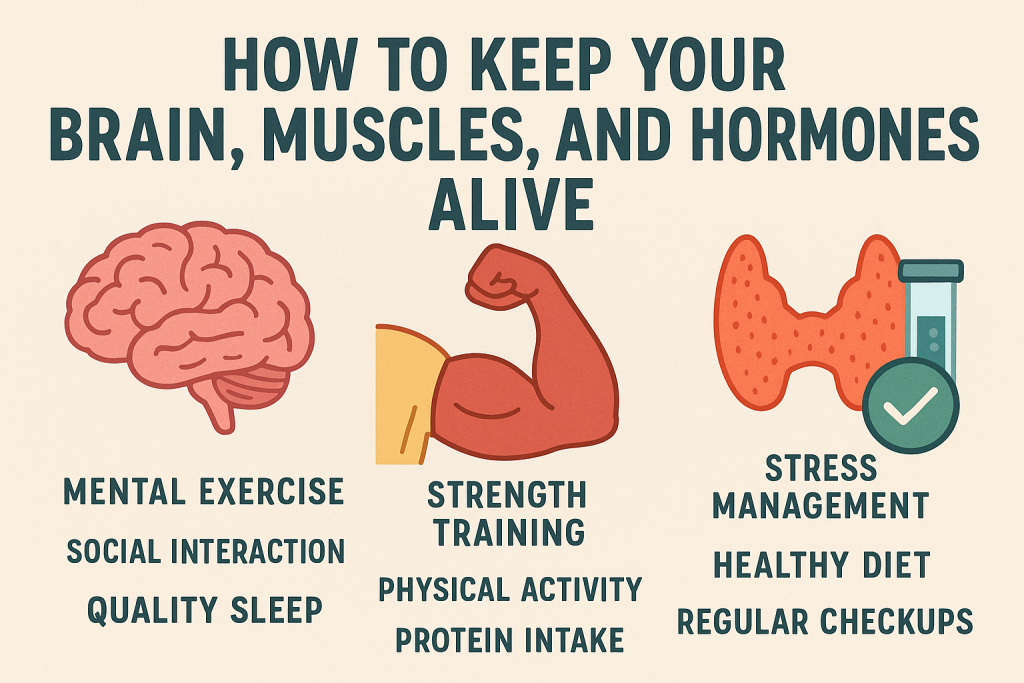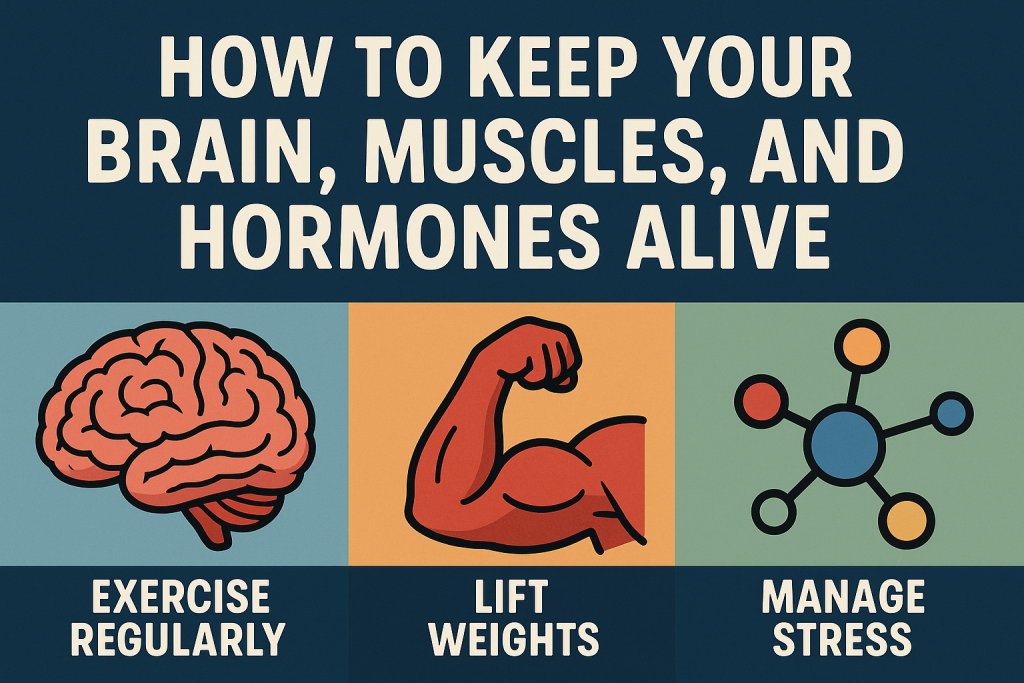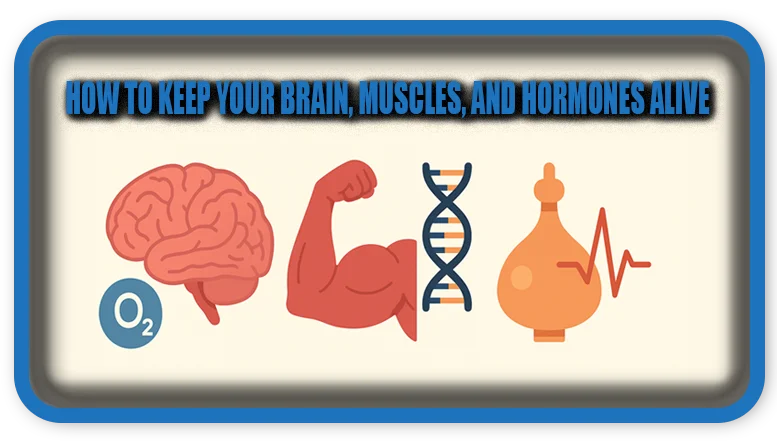⏲️ Estimated reading time: 5 min
Your brain, muscles, and hormones rely on specific nutrients and lifestyle habits to function and stay alive. From oxygen and amino acids to vitamins and hormones, here’s a detailed breakdown of what fuels and sustains your body’s key systems.
Your body is a complex and brilliant system, composed of interconnected mechanisms working day and night to keep you alive. Among the most vital elements of human survival are the brain, the muscular system, and the endocrine (hormonal) system. Each of these systems relies on specific inputs like oxygen, nutrients, and sleep to function optimally. If one falls behind, it impacts the others.
In this article, we’ll explore the fundamental elements that keep your brain, muscles, and hormones alive, healthy, and high-performing.
🧠 What Keeps Your Brain Alive?
Your brain is the control center of your body, and its function is heavily dependent on certain physiological factors. Here’s what it needs:
1. Oxygen
Your brain consumes about 20% of your body’s oxygen, despite only weighing about 2% of your body mass. Oxygen is transported via red blood cells and is essential for energy production in brain cells.
2. Glucose
Glucose is the main fuel source for the brain. Without it, brain function slows, leading to confusion, fatigue, and potentially unconsciousness. However, too much sugar over time can impair cognition and increase the risk of neurodegenerative diseases.
3. Healthy Fats (Especially Omega-3s)
Omega-3 fatty acids like DHA found in fish are critical for maintaining the structure of neurons and aiding in communication between brain cells.
4. Electrolytes (Sodium, Potassium, Magnesium)
Neurons rely on electric charges to communicate, and these charges are maintained by electrolytes. An imbalance can cause seizures, confusion, or even coma.
5. Vitamins B1, B6, B12 & Folate
These B-complex vitamins help produce neurotransmitters, form myelin sheaths (protective nerve coverings), and convert glucose into energy.
6. Sleep and Brain Detox
Sleep is not just for rest it’s when your brain clears out waste products like beta-amyloid plaques. Chronic sleep deprivation is directly linked to reduced brain performance and Alzheimer’s risk.
💪 What Keeps Your Muscles Alive?
Muscles power every movement from lifting groceries to maintaining your posture. To stay strong and functional, they need the following:
1. Protein and Amino Acids
Muscles are made of protein, and amino acids are the building blocks of protein. You get these from foods like eggs, lean meats, and legumes.
2. ATP (Adenosine Triphosphate)
ATP is the energy currency of the cell. Every muscle contraction requires ATP. Your body regenerates ATP using carbohydrates, fats, and sometimes proteins.
3. Creatine
Found in red meat and synthesized in the body, creatine helps replenish ATP during high-intensity activities and supports muscle power and endurance.
4. Calcium, Potassium & Magnesium
- Calcium initiates muscle contractions.
- Potassium helps muscles relax after contraction.
- Magnesium prevents cramps and supports recovery.
5. Testosterone & Growth Hormone
These anabolic hormones help repair and grow muscle tissue. Without sufficient hormonal support, muscle recovery and development are impaired.
6. Insulin
This hormone doesn’t just regulate blood sugar it also shuttles amino acids and glucose into muscle cells, aiding recovery and growth post-exercise.
7. Resistance Training
Muscles adapt to stress. Strength training stimulates muscle fibers to grow back bigger and stronger, increasing longevity and metabolic function.

🔁 What Keeps Your Hormones Alive?
Hormones are the chemical messengers of your body. They regulate everything from mood to metabolism. To keep them in balance, your body requires:
1. Cholesterol
Surprising to some, cholesterol is the precursor to many hormones, including testosterone, estrogen, progesterone, and cortisol. Low-fat, low-cholesterol diets can disrupt hormone balance.
2. Iodine & Selenium
These trace minerals are essential for thyroid function, which governs metabolism, energy, and mood. Seaweed, fish, and Brazil nuts are great sources.
3. Vitamin D
Technically a hormone, vitamin D supports bone health, mood, immune function, and sex hormone regulation. Sunlight is the best source.
4. Zinc & Magnesium
- Zinc is necessary for testosterone production and sperm health.
- Magnesium supports hundreds of enzymatic reactions and reduces stress-induced cortisol spikes.
5. Healthy Fats
Hormones are made from lipids, so dietary fats especially unsaturated fats from olive oil, avocado, and fish are essential.
6. Balanced Blood Sugar
Constant blood sugar spikes lead to high insulin levels and eventually hormonal resistance. Stable blood sugar maintains a stable hormone environment.
7. Sleep & Circadian Rhythm
Hormones like melatonin, growth hormone, and cortisol follow a circadian cycle. Disrupted sleep leads to chaotic hormone production and impacts everything from appetite to stress.
🧩 The Connection Between Brain, Muscle, and Hormones
These three systems don’t work in isolation.
- A stressed brain releases excess cortisol, which breaks down muscle tissue and suppresses testosterone.
- Poor hormone health (like low thyroid function) leads to fatigue, brain fog, and muscle weakness.
- Weak muscles reduce physical activity, which is key for hormone production and brain health.
When you support one system, you help the others. This is why a holistic lifestyle which includes nutritious food, regular exercise, quality sleep, and mental stimulation is non-negotiable.
🛠️ Practical Tips for Supporting All Three
- Eat a balanced diet – Include lean proteins, healthy fats, complex carbs, and micronutrient-rich vegetables.
- Hydrate well – Your body needs water for every metabolic process.
- Get sunlight – Just 15–30 minutes a day helps maintain vitamin D levels.
- Train regularly – Weightlifting, cardio, and even walking boost brain, muscle, and hormonal health.
- Sleep 7–9 hours – It’s not just about quantity, but quality too.
- Avoid excess sugar and alcohol – Both are hormonal disruptors and stressors on the brain.
- Manage stress – Meditation, nature walks, and hobbies reduce cortisol and rebalance your system.

Your brain, muscles, and hormones work as a powerful triad that fuels every function of life from thinking and moving to feeling and thriving. When you give your body what it needs oxygen, nutrients, exercise, rest, and balance you lay the foundation for a vibrant and long life.
Don’t wait for symptoms of imbalance. Start building habits that support your entire system mentally, physically, and hormonally today.
📩 Do you have questions or suggestions? Leave a comment or contact us!
🏷️ Tags: brain health, muscle recovery, hormone balance, omega-3, testosterone, nutrition, fitness, sleep, metabolism, vitamins
Only logged-in users can submit reports.
Discover more from HelpZone
Subscribe to get the latest posts sent to your email.

